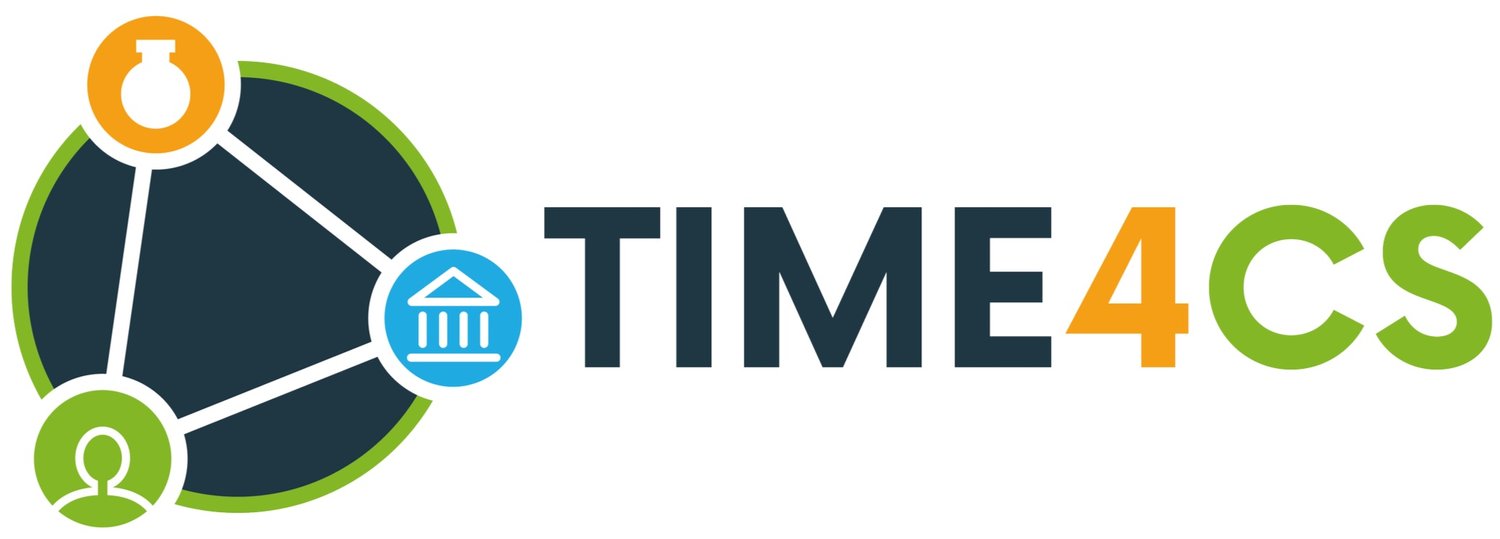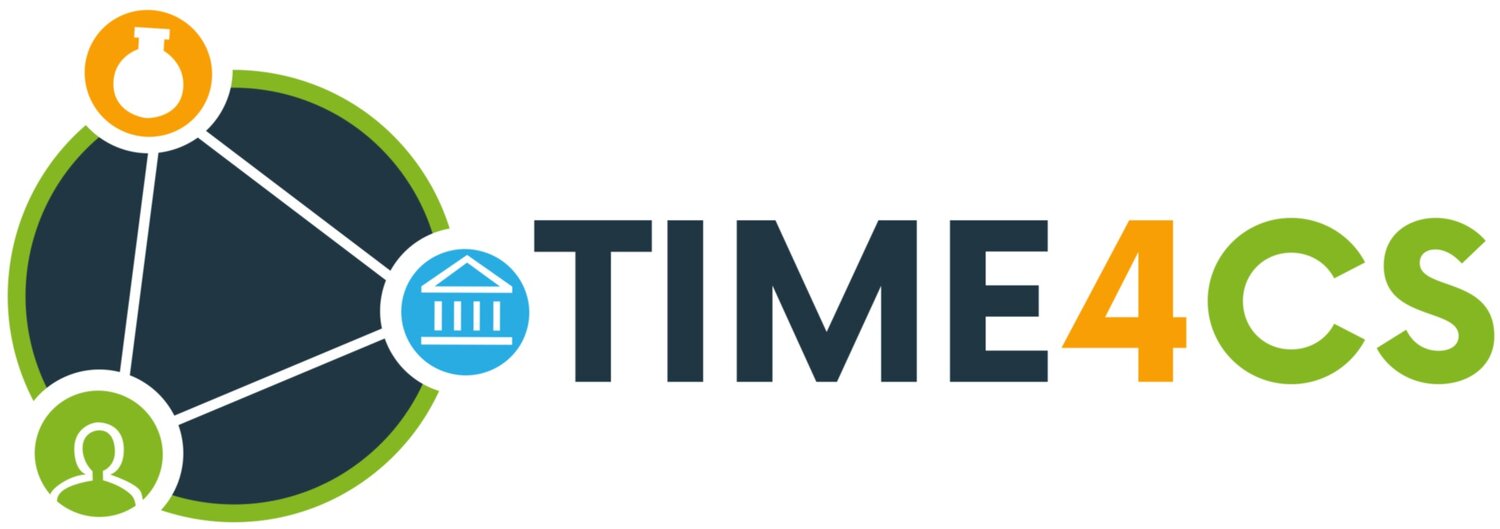Lessons learned from the TIME4CS Implementers in 2022 and outlook for 2023
In 2022, the TIME4CS project team organised two Implementer Forum Meetings to ensure the exchange between the four Implementers and two Implementer Journeys with the supporting Front-Runners. The meetings should ensure the reflection of lessons learned through the course of the project and work collaboratively on potential solutions and good practices.
In April and November 2022, the Implementers exchanged their first experiences of their implementation activities with each other and outlined some key recommendations for other institutions, that also want to implement the Citizen Science approach in their institutions.
· Citizen Science perceived as being triggered from "top to down" by the management
Many scientists in the RPOs perceive Citizen Science as being pushed from funding agencies as an "on-top" activity for research in an extremely competitive environment that requires "on-top" skills and knowledge that many researchers do not have. For them, it is difficult to differentiate Citizen Science from science communication, participatory research etc. They require a better understanding of the value of Citizen Science for their research, as well as role models and good practices that they can refer to. Citizen Science facilitators are an important way to support researchers and act as change managers in this context. Also, "Inspiring Sessions" that show good practice projects from related fields of research and allow for the connection with other researchers interested in Citizen Science are an important Grounding Action.
· Networks
Being part of and active in Citizen Science networks was perceived as very supportive and rewarding for the people who should trigger Citizen Science within their organisations. Networks help to exchange ideas and experiences with more experienced Citizen Science experts and thus widen one’s own knowledge and perspectives about the topic. To gain more ease in handling Citizen Science activities, it was highly recommended to start with Citizen Science by “only” being a partner in a larger project, where newcomers could learn through observation and get a consultation in the public engagement process. By working together with Citizen Science experts, new teams could be forged together and the possibility to get in contact with Citizen Science “ambassadors” improved. During the TIME4CS project networks were established and Implementers with basic levels of knowledge and experience in Citizen Science were very well supported by Front-Runners. But also reaching out to wider networks, like becoming a member of the ECSA and their working groups was an important outcome of TIME4CS so far and is highly recommended to other RPOs interested in Citizen Science.
· Importance of the organisational context, which allows change to happen.
Implementers realised that one of the first activities was to understand the context in which the institutional change should happen. Implementing institutional changes, which need support from both - top-down and bottom-up - requires reaching out to different stakeholders in the organisation - from management, to support staff, researchers, and students - addressing all of them with a specific message that considers their needs and challenges. For this communication and internal networking task, good internal communication tools are important, to communicate the new content to different audiences. It also requires understanding formal institutional procedures, when triggering a change in institutional policy documents and guidelines. These procedures must be followed and can be very time-consuming, thus need to be considered from the beginning in the planning of Grounding Actions.
· Citizen Science facilitator or contact point
Implementers stressed the importance of a Citizen Science facilitator, who could not only provide information and advice to interested researchers, but also promote the topic internally and towards the management. We learned that the huge issue about this Citizen Science facilitator is sustainable funding. As there is no internal funding for this facilitator at this early stage of involvement in Implementer organizations, the funding is acquired externally (e.g. by research grants). Another approach is to add Citizen Science as an extra agenda to existing support staff, like teams for Open Science, Science Communication, and Strategy and Funding.
· Support of management and initial funding
As mentioned earlier, the early involvement of the management is key for the implementation of Grounding Actions. This support ideally results in the first internal funding for Citizen Science which helps collect first hands-on experiences with Citizen Science and overcome existing prejudices on the side of researchers.
· Concrete information on successful Citizen Science projects
Successful stories are helpful to illustrate the benefits of Citizen Science to researchers and support staff, who are less familiar with the concept. These stories provide inspiration for the creation of new projects and help to understand how the usual pitfalls of citizens’ engagement could be avoided. The challenge in this regard is how to initiate these successful stories if there are no Citizen Science projects organised in RPOs yet. A solution suggested by the Implementers was to search for external experts who have already been successfully implementing Citizen Science activities in a related research topic and invite them to present at “Inspiring Sessions” for researchers.
· Trainings
Understanding the concept alone is not enough to start with a Citizen Science project. The knowledge of how to do it is crucial for researchers to re-think already proven workflows and processes. Training not only provides knowledge and confidence but also inspires and facilitates the basic idea of Citizen Science and is fostering an “open culture” at the respective RPOs. Trainings are developed in all implementing organizations - but all implementing organizations have also created new Grounding Actions that should specifically investigate how these trainings could be sustained.
The regular internal exchange between the Implementers is steadily increasing their knowledge of Citizen Science. During this learning process, the TIME4CS team members are the key drivers of Citizen Science in their organizations and reach out to other interested researchers and support groups within their RPOs. This first positive change could be the basis for reaching out in the next step to a wider research community in the following years. While for the management the key driver is to raise funding for further projects and increase the visibility and reputation of their organisation, the researchers are not only concerned about future funding possibilities, but also to conduct high-level research and get valuable results for publications in high-impact journals. However, financial support is still the key issue when it comes to the establishment of sustainable supportive Citizen Science within organizations.
For the last project year in 2023, two Implementer Forum Meetings will be organised in April and October 2023 to discuss further insights and supportive best practices for future activities beyond the end of the project (see blog post in November 2023). But not only the Implementers learned something from the mutual learning activities of the TIME4CS project. The Front-Runners also gained important insights from the project activities, which will be presented in one of the next blog posts.
For more details about the Implementer and Front-Runner activities read D5.2 Interim Evaluation and Impact Assessment Report.
Authors: Claudia Magdalena Fabian (ZSI)
Teresa Schaefer (ZSI)

